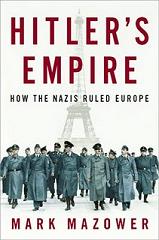
Hitler's Empire: How the nazis Ruled Europe
Mark Mazower
726 pages including index and notes
published in 2008
"Germany could have racial purity or imperial domination, but it could not have both."
That's the fundamental paradox that Mark Mazower uncovers in Hitler's Empire: How the Nazis Ruled Europe. On the one hand, there is the Nazi's obsession with making Germany a pure Aryan state, expelling or murdering the lesser races within its borders. On the other, their equally compelling obsession to rule Europe, or at least "reunite" all those parts of Greater Germany outside the German borders. But with the Anschluss of Austria, the annexation of the Sudetenland, the further invasion of what was left of Czechoslovakia, not to mention the invasion of Poland, it brought not just many more Germans, but also millions of Poles, Czechs, Jews and others under Nazi control. The question was, what to do with them and the somewhat accidental empire Nazi Germany had acquired.
A question that became even harder after Germany had defeated the western allies and rule France, Norway and the Low Countries, had subjugated Yugoslavia and Greece to come to the aid of Italy, then had invaded Russia and at a stroke added immense new territories to its empire, populated with millions upon millions of those the Reich saw as racial enemies. Nazi ideology wanted a pure state, wanted to get rid of the Jews and the Poles and all those others living in those conquered territories. At the same time the economic realities, not to mention the demands of war meant that at least in the short term these "undesirables" could not be removed. If Nazi Germany wanted to rule an efficient empire and defeat its enemies in the East and West, it could not do so without the support, coerced or not, of those "inferior" people it rather wanted to get rid off.
Because we know how things turned out it's hard to understand that even in Poland, even in the USSR, Nazi Germany at first for quite a few more people than would willingly admit afterwards was if not their preferred choice master, at least the lesser of two evils. In the USSR especially there were numerous people who saw the Nazis as their liberators from the Soviet terror and if they had wanted to the Germans could've used e.g. Ukrainian nationalism to support its war with the USSR. Yet instead Nazi brutality quickly helped shatter the illusion that collaboration with Germany could work for anybody but the Germans. Almost every time that Nazi ideology squared off against wartime expediency the former won.
Partially this was the result of having people in charge who "kept talking about a Thousand Year Reich but they couldn't think ahead for more than five minutes", but in the end most of the blame for this lies with Hitler, Mazower argues. As we all know the myth of the ruthlessly efficient Nazi Empire is correct only in as far as the Nazis were ruthless. In reality it was ruled by competing strongmen all trying to build out their own fiefdoms by working towards Hitler's wishes. In that semi-anarchy the more sane voices (by Nazi standards) got lost. Hitler himself encouraged grandiose planning, while looking unfavourably at anything that smacked of legalism and the restriction of Germany's power.
This fundamental inability to compromise, to understand that if you need allies you occasionally need to throw them a bone as well is also on display in the second part of Hitler's Empire. Where the first part, as described above, largely is about Germany's quest for Lebensraum and how that worked in practise, the second part looks at international relationships, such as they were and the New Order Germany imposed on Occupied Europe. Again at first there is quite a lot of good will towards Germany at first, or at least a certain grudging acceptance of the new masters. And again the Nazis waste this by going for ideology and short term goals over compromise. It all kept working as long as Germany won its battles; once the tide turned, both allied and occupied countries started to look for the exits.
Hitler's Empire is a fascinating, well written book about at times horrific subject. Mazower is thorough in his research and writing, has a good grip on the details but doesn't let them overwhelm the subject. Recommended.